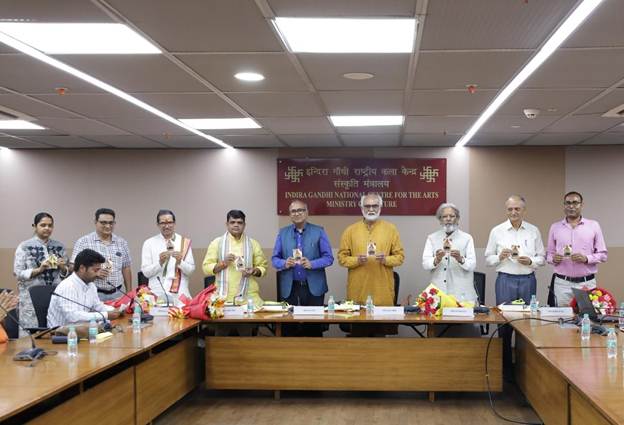Ministry of Culture
"Raising societal awareness about manuscripts is essential: Dr. Sachchidanand Joshi
IGNCA Launches Essential Book on the Preservation and Interpretation of India's Manuscript Heritage
प्रविष्टि तिथि:
25 APR 2025 9:00PM by PIB Delhi
The Indira Gandhi National Centre for the Arts (IGNCA), through its Kalānidhi Division, organised the release and discussion of the significant book ‘ Pandulipi evam Samikshit Patha- Sampadan’ (Abhinav Paramarsh ke Sath)" authored by Prof. Vasantkumar M. Bhatt. The event was presided over by Dr. Sachchidanand Joshi, Member Secretary, IGNCA, with Prof. Ramesh Chandra Bhardwaj, former Vice Chancellor of Maharshi Valmiki Sanskrit University, as the Chief Guest.

Alongside the author, the programme featured remarks from Prof. Ramesh Chandra Gaur, Head of the Kalānidhi Division and Dean (Administration); Dr. Kirtikant Sharma, co-editor of the volume; and Prof. Shiv Shankar Mishra, Head of the Research Department at Shri Lal Bahadur Shastri National Sanskrit University. This publication offers a significant study of India’s manuscript tradition, diverse methodologies of textual editing, and the contemporary relevance of critically edited texts. The panel discussion held alongside the release reflected deeply on the need to preserve, study, and reinterpret India's knowledge systems. The event saw enthusiastic participation from research scholars, academicians, Sanskrit experts, and distinguished figures from the fields of art and culture.
Dr. Sachchidanand Joshi, while speaking at the occasion, emphasised the need to bring manuscriptology into wider discourse beyond academic circles and described the published volume as a much-needed and pertinent contribution to the field. He noted that manuscripts are not merely archival records but living repositories of civilisational knowledge that must be actively studied, interpreted, and shared. He informed the audience about the ‘Gyan Bharatam’ initiative of the Government of India, under which efforts are being made to integrate traditional knowledge systems-particularly manuscripts-into contemporary educational and cultural frameworks. Since its inception, IGNCA has been a key institution in manuscriptology, undertaking wide-ranging and major works that extend beyond national borders. Dr. Joshi highlighted that IGNCA has led efforts in preserving manuscripts from India, Thailand, Vietnam, Mongolia and others. He underlined that such vast undertakings cannot be sustained by a single institution alone and called for collaborative engagement from scholars, technologists, and cultural practitioners. Subsequently, he highlighted the need for greater societal awareness about manuscripts, stressing that the responsibility extends beyond one institution.
He also mentioned IGNCA’s manuscript reading courses, aimed at building capacity and sparking interest among students and researchers.“These texts must not remain with conservators alone; their meaning must be accessible to all,” he stated. Through these courses, the Centre seeks to both conserve and cultivate a community engaged with these rich traditions.
Praising the book, Prof. Ramesh Chandra Bhardwaj said, "This book is so important that it will shape the future of the country, as millions of manuscripts lie in India, and it is the youth who will carry forward the task of preserving them. This is the book that will provide the youth with vision, and they will do much work in this field going forward. Therefore, we must dedicate this book to society and the nation as an exemplary work." He further emphasised that this book serves as a foundational text in the field, bridging the gap in both Sanskrit scholarship and the broader study of manuscripts. On this occasion, Prof. Vasantkumar M. Bhatt, while discussing the book, elaborated on the process of textual editing of manuscripts in India. He mentioned that earlier, before writing a commentary on any text, our commentators would gather manuscripts from different regions. He emphasised that the foundational text should be edited with thoughtful deliberations, ensuring it is placed in the right context, thereby facilitating a deeper understanding and meaningful engagement with its content. Dr. Kirtikant Sharma and Professor Shiv Shankar Mishra also shared their views on the occasion.
Earlier, Prof. Ramesh Chandra Gaur delivered the welcome address, setting the tone for the event. He expressed his gratitude to all attendees and highlighted the significance of the book launch in the context of manuscript studies.
****
Sunil Kumar Tiwari
pibculture[at]gmail[dot]com
(रिलीज़ आईडी: 2124463)
आगंतुक पटल : 452